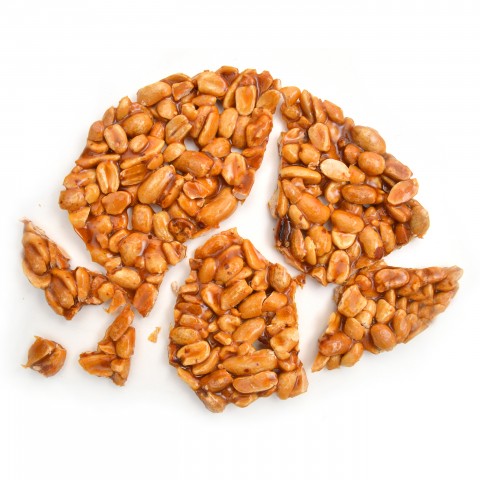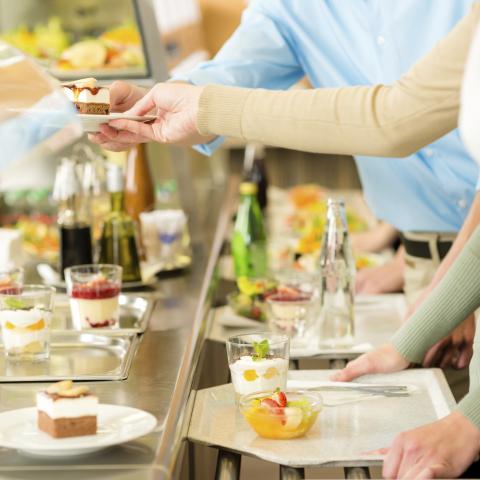Korean cuisine is one of the most popular foods in the world. Today, we will introduce you to more than 60 useful Korean restaurant phrases.

 Table of Contents
Table of Contents
- Why is Korean language learning important for ordering food?
- Let’s learn essential Korean Phrases – Before Dining
- During Dining
- After Dining
- How KoreanClass101 Can Help with Learning Korean
1. Why is Korean language learning important for ordering food?
English is one of the foreign languages that Koreans learn at school. Therefore most of them can speak basic English. If you are in the city area, waiters and waitresses can speak English. You may be thinking that it isn’t necessary to learn the Korean language because of that. However, if you visit local restaurants, or are looking for “hidden treasure” spots, it is less likely that the waitresses and waiters will be able to speak English. Therefore, learning Korean will allow you to immerse yourself in Korean culture more easily!
In general, if you can spend some time studying Korean phrases for ordering food and practicing your Korean with the locals, you will receive a heartwarming, better experience at a restaurant. It will be a great experience for you to practice Korean with local people too.
In this blog, we will teach you essential Korean phrases and Korean food words that you can immediately start using once you are in Korea. We also categorized Korean phrases into several different categories to provide a better learning Korean experience for you.
2. Let’s learn essential Korean Phrases – Before Dining
1. Learning Korean: Making a reservation
The good news is that most restaurants in Korea do not require reservations. Therefore, you can walk in and sit at a vacant seat. However, if you are going to have a fancy dish at a hotel or somewhere more exclusive, reservations are necessary. Below is a list of essential Korean phrases you can use for different scenarios.
| Essential korean phrases – Making a Booking | |
| Korean Phrases | English Translations |
| 예약하고 싶습니다. Yeyaghago sipseumnida. | “I would like to make a reservation please” |
| 5월 7일 토요일 오후 5시에 2명 예약할 수 있나요? Owol chiril toyoil ohu daseossie dumyeong yeyaghal su innayo? | “Can I get a table for two on Saturday, May 7th, at 5pm?” |
| 어른 2명, 아이 1명 예약할게요. Eoreun dumyeong, ai hanmyeong yeyaghalgeyo. | “I would like to make a reservation for 2 adults and a child” |
| (이름은) 에이미 정입니다. (ireum-eun) Eimi jeongimnida | “My name is Amy Jeong” |
| 전화번호는 000-0000-0000입니다. Jeonhwabeonhoneun 000-0000-0000imnida. | “My number is 000-0000-0000” |
| 할랄 음식을 제공합니까? Hallal eumsigeul jegonghamnikka? | “Do you serve Halal food?” |
| 주차장있나요? Juchajanginnayo? | “Is there a parking lot?” |
| 창가 자리를 예약하고 싶습니다. Changga jarireul yeyakhago sipseumnida. | “I would like to reserve a seat by the window” |
Want to learn more Korean? Check out these two pages:
- ➜ Check out “Useful Phrases For a Phone Call” to learn more about making phone calls in Korean
➜ Learn how to ask for smoking or non-smoking seats in Korean
2. Learning Korean: Entering a Restaurant without a Reservation
As I mentioned above, you can enter a restaurant without booking a table. If you go to a slightly fancy restaurant, most of the time, the staff is going to take you to a vacant seat and you just need to wait by the entrance. Some restaurants don’t do this; therefore, you will need to quickly scan inside for an empty seat and take a seat.
Here is a list of essential Korean phrases that you can learn. These Korean phrases are commonly used in Korea.
| Essential korean phrases – Entering a Restaurant | |
| Korean Phrases | English Translations |
| [staff] 몇분이세요? Myeoytbuniseyo? | “How many people are there?” |
| 2명이요. Dumyeongiyo. | “2 people” |
| [staff] 예약 하셨나요? Yeyaghasyeonnayo? | “Did you make a reservation?” |
| 네, 예약했습니다. Ne, yeyaghaesseumnida. | “Yes, I made a reservation” |
| 아니요, 예약 안했습니다. Aniyo, yeyak anhaesseumnida. | “No, I didn’t make a reservation” |
| 빈 자리가 있어요? Bin jariga isseoyo? | “Do you have any free tables?” |
| 얼마나 기다려야돼요? Eolmana gidaryeoyadwaeyo? | “How long do we have to wait?” |
| 테라스쪽에 테이블이 있습니까? Teraseujjoge teibeuri issseumnikka? | “Do you have a table on the patio?” |
3. Learning Korean: Entering a Restaurant with a Reservation
When you make a reservation at a Korean restaurant, all you need to do is to say that you made a reservation to a staff member. The rest will be taken care of by a waitress or waiter. Therefore you don’t need to study too many Korean phrases for this.
Here is a list of Korean restaurant phrases that you can use:
| Essential korean phrases – Entering a Restaurant | |
| Korean Phrases | English Translations |
| [staff] 예약 하셨나요? Yeyaghasyeonnayo? | “Did you make a reservation?” |
| 네, 예약했습니다. Ne, yeyaghaesseumnida. | “Yes, I made a reservation” |
| 이지영으로 5시에 예약했어요. Ijiyeongeuro daseossie yeyaghaesseoyo. | “I made a reservation at 5 o’clock with Lee Ji-young.” |
- ➜ Can you say “we are people of four” in Korean? Check out Korean Restaurant 5: How Many People? (And Numbers) from KoreanClass101

3. During Dining
1. Learning Korean: Asking Questions from The Menu
Most of the dishes that you see on the menu may look too spicy, but some of the dishes are not spicy at all! If you are a foreigner visiting Korea, most likely, you will be asked by a staff member whether you are okay with the spicy food or not. They can adjust the spiciness for you, so if there is a dish that you want to try but are not sure if it’d be too spicy for you or not, kindly ask the staff to make it less spicy for you.
Here is a list of essential Korean phrases that you can use when asking questions about the dishes from the menu:
| Essential korean phrases – Asking Questions from The Menu | |
| Korean Phrases | English Translations |
| 메뉴 좀 주세요. Menyu jom juseyo. 메뉴판 좀 주세요 Menyupan jom juseyo | “Please give me the menu” |
| 영어로 된 메뉴판 있나요? Yeongeoro doen menyupan innayo? | “Do you have the menu in English?” |
| (여기서) 가장 인기있는 요리는 뭐예요? (yeogiseo) Gajang ingiinneun yorineun mwoyeyo? | “What is the most popular dish (here)?” |
| 이거 많이 매워요?I geo mani maewoyo? | “Is this very spicy?” |
| 덜 맵게 해주실 수 있나요? Deol maebge haejusil su innayo? | “Can you make it less spicy?” |
| 어떤 거 추천하시나요? Eotteon geo chucheonhasinayo? | “ What do you recommend?” |
| [staff] 매운거 먹을 수 있어요? Maeungeo meogeul su isseoyo? | “Can you eat spicy food?” |
| 네, 먹을 수 있어요. Ne, meogeul su isseoyo. | “Yes, I can” |
| 아니요, 못 먹어요. Aniyo, mot meogeoyo. | “No, I can’t” |
| 이거 뭐예요? Igeo mwoyeyo? | “What is this?” |
| 세트 메뉴 있어요? Seteu menyu isseoyo? | “Do you have a set menu?” |
- ➜ Do you want to learn how to read lunch menus in Korean? Check out this page!

2. Learning Korean: When You Have a Special Request (eg. vegan, allergy)
Are you vegetarian or vegan? Then this section is for you. More and more people are becoming aware of vegetarians and vegans. If you spend some time researching online, it won’t be too hard to find vegetarian/vegan-friendly restaurants and cafes in the city. However, you can also kindly ask a staff member to remove meats or anything that you cannot eat at any restaurant. Here is a list of useful Korean phrases that you can say when you are vegetarian, vegan, or allergic to something.
Here is the list of essential Korean phrases that you can use.
| Essential korean phrases – When You Have a Special Request | |
| Korean Phrases | English Translations |
| 매운걸 잘 못 먹어요. Maeungeol jal mot meogeoyo. 맵지않은 음식 추천해주시겠어요? Maebjianeun eumsik chucheonhaejusigesseoyo? | “I am not good with spicy food, could you recommend non-spicy dishes?” |
| 전 고기를 안 먹어요. Jeon gogireul an meogeoyo. | “I don’t eat meat.” |
| 견과류에 알레르기가 있어요. Gyeongwaryue alleleugiga isseoyo. 견과류없이 샐러드를 만들어 주시겠어요? Gyeongwaryueobsi saelleodeureul mandeureo jusigesseoyo? | “I’m allergic to tree nuts. Could you make a salad without nuts?” |
| 저는 비건이에요. 비건 옵션이 있습니까? Jeoneun bigeonieyo. Bigeon obsyeoni issseumnikka? | “I am vegan. Do you have vegan options?” |
| 저는 베지테리언이에요. 베지테리언 옵션이 있습니까? Jeoneun bejiterieonieyo. Bejiterieon obsyeon-i issseubnikka? | “I am vegetarian. Do you have vegetarian options?” |
| 이 음식에서 고기를 빼고 주시겠습니까? I eumsigeseo gogireul ppaego jusigessseumnikka? | “Could you remove the meat from this dish?” |
| 할랄인가요? Hallalingayo? | “Is this Halal?” |
| 돼지고기 못 먹어요. Dwaejigogi mot meogeoyo | “I can’t eat pork.” |
- ➜ Learn vocabulary related to fruits and vegetables
3. Learning Korean: The List of Korean Food Words – Vegetarian Dishes
Here is another list of vegetarian dishes that you can try! Remember, even though some of the dishes contain only vegetables, some dishes, such as soup, contain a seafood base. Please make sure to ask the staff what ingredients are being used before ordering to avoid eating meats/seafood by mistake!
Here is the list of Korean food words.
| The List of Korean food words (Vegetarian Dishes) | |
| Name of the dish | What is it? |
| 비빔밥 Bibimbap | Bibimbap is a rice and vegetable meal served with a fried egg on top. Also, they might add a little marinated meat in to add more flavours to the dish. If you ask for a vegetarian dish, they will remove meat and egg for you. |
| 된장찌개 Doenjang-jjigae | It is a brown-coloured soup made of bean paste called “doenjang.” Keep in mind that the soup base is anchovy or fishbone stock. If you don’t eat seafood, this dish may not be a good idea. |
| 잡채 Japchae | These are vegetables and noodles which are made of sweet potatoes. Default Japchae comes with sliced meat; make sure to ask for no meat when ordering this dish. |
| 김밥 Gimbap | This is one of the most popular street foods in Korea, and it comes with various ingredients. Gimbap is strips of pickled vegetables and rice rolled in seaweed. Most of the restaurants will have veggie gimbap – 야채김밥 (yachae gimbap). |
| 감자전 GamjaJeon | GamjaJeon is potato pancakes that contain vegetables like onions, carrots, and so on. Another popular option is Kimchi jeon, which is a pancake with Kimchi. |
| 김치 Kimchi | This is a Korean traditional side dish, and this will be served at every restaurant you go to. Kimchi is pickled cabbage in a chili paste. However, be aware that most are made with fish sauce. |
| 군밤 Gunbam | These are roasted chestnuts that are often found on the streets. |

4. Learning Korean: Asking Questions about 셀프 (self)
Did you know that some of the restaurants have a designated area where you can bring water, side dishes, soups, and so on by yourself? More and more local restaurants are asking guests to take care of their own water and side dishes; you will see a written text on the wall saying “물은 셀프입니다” (mureun selpeuimnida), meaning “water is self-service.” If you see this Korean phrase at a restaurant, most likely, you will have to bring your own side dishes from the designated area.
| Essential korean phrases – Asking Questions about Self-Service | |
| Korean Phrases | English Translations |
| 물이랑 반찬은 셀프입니다. Murirang banchaneun selpeuimnida | “Water and side-dishes are self-service” |
| 물은 어디서 가져올 수 있나요? Mureun eodiseo gajyeool su innayo? | “Where can I get a glass of water? ” |
| 김치통에 김치가 다 떨어졌어요. 리필 해주시겠어요? Gimchitonge gimchiga da tteoreojyeosseoyo. Ripil haejusigesseoyo? | “The Kimchi container is empty. Could you refill kimchi? ” |
| 물이 다 떨어졌어요. 물 새로 주세요. Muri da tteoreojyeosseoyo. Mul saero juseyo. | “There is no more water. Can I have some water, please?” |
5. Learning Korean: Asking Staff to Bring Some Items (eg. napkins, chopsticks, etc)
There are restaurants that don’t have a “self-service” area. In that case, you can directly ask the staff if you need anything. Here is the list of Korean phrases to ask a staff member to bring items for you.
| Essential korean phrases – Asking Staff to Bring Items | |
| Korean Phrases | English Translations |
| 물 좀 주세요. Mul jom juseyo. 물 좀 주시겠어요? Mul jom jusigesseoyo? | “Please give me some water” |
| 새로운 젓가락 주시겠어요? Saeroun jeotgarag jusigesseoyo? | “Can I get a new set of chopsticks? (if you dropped them)” |
| 티슈 (냅킨) 좀 주시겠어요? Tisyu (naebkin) jom jusigesseoyo? | “Can I get some more napkins?” |
| 이 컵은 깨끗하지 않네요. 새 컵으로 주시겠어요? I keobeun kkaekkeuthaji anneyo. Sae keobeuro jusigesseoyo? | “This cup is not clean. Could I have a new cup?” |
| 주문한 음식이 아직 안왔어요. Jumunhan eumsigi ajik anwasseoyo. | “The food I ordered hasn’t arrived yet.” |
- ➜ Learn useful Korean phrases on how to order and get the check in Korean
6. Other Questions Related to Restaurants (eg. baby chairs, bathroom)
Here is the list of Korean phrases (questions) that you can ask at a restaurant:
| Essential Korean phrases – Other Useful Korean Phrases | |
| Korean Phrases | English Translations |
| 화장실이 어디에 있어요? Hwajangsiri eodie isseoyo? | “Where is the bathroom?” |
| 아기의자 제공하나요? Agiuija jegonghanayo? | “Do you provide baby chairs?” |
| 어린이용 메뉴있어요? Eoriniyong menyuisseoyo? | “Do you have a children’s menu?” |
- ➜ Want to learn more about commonly used restaurant-related vocabulary and phrases? Check out “Vocabulary and Phrases at the restaurant”
7. Learning Korean: Giving Feedback about The Dish
Oftentimes, a waiter or a waitress will ask if you enjoyed the dishes when you are about to pay the bills. Here is the list of essential Korean phrases to give feedback about the dish you ate.
| Essential Korean phrases – Giving Feedback about the Dish in Korean | |
| Korean Phrases | English Translations |
| 잘 먹었습니다. Jal meogeotsseumnida. | Compliments to the chef. |
| 배불러요! Baebulleoyo! | I’m so full! |
| 맛있어요. Masisseoyo. | This is delicious. |
| 너무 매워요. Neomu maewoyo. | This is too spicy. |

4. After Dining
Do you tip a waitress or waiter in your country? If so, you don’t need to tip them in Korea. If you do give them a tip, they may take it as an offense, so please remember not to give a tip in Korea.
Also, once you order your dishes, the waiter or waitress will give you a recipe (bill) on your table. Remember to take this to the cashier to make a payment.
1. Learning Korean: Asking for Bills in Korean
Here is a list of useful Korean phrases to learn when you pay the bills in Korea.
| Essential Korean phrases – Asking for Bills in Korean | |
| Korean Phrases | English Translations |
| (If you have not received a bill) 계산서 주세요. Gyesanseo juseyo. | “Bill, please.” |
| 전체 얼마예요? Jeonche eolmayeyo? | “What’s the total price?” |
| 내가 낼게. Naega naelge. | “It’s on me.” (casual) |
| 제가 계산할게요. Jega gyesanhalgeyo. | “It’s on me.” (formal) |
| 저번에 저녁 비용 냈으니까 이번은 내가 낼게. Jeobeone jeonyeok biyong naesseunikka ibeoneun naega naelkke. | “You paid for the dinner last time, so I will pay for this.” (casual) |
| 카드로 계산할 수 있을까요? Kadeuro gyesanhal su isseulkkayo? | “Do you take credit cards?” |
| 현금으로 낼 수 있어요? Hyungeumeuro nael su isseoyo? | “Can I pay with cash?” |
| 따로 계산해 주시겠어요? Ttaro gyesanhae jusigesseoyo? | “Can we pay separately?” |
| 계산서에 착오가 있는 것 같아요. Gyesanseoe chagoga inneun geot gatayo. | “I think there is a mistake in the bill” |
| 테이크아웃(포장)이 가능한가요? Teikeuaus(pojang)i ganeunghangayo? | “Is takeout (packaging) possible?” |
| 영수증 주세요. Yeongsujeung juseyo. | “I’d like a receipt, please.” |
| 영수증 필요 없어요. Yeongsujeung piryo eobseoyo. | “I don’t need a receipt.” |

5. How KoreanClass101 Can Help with Learning Korean
In this blog article, we introduced essential Korean phrases for ordering food as well as famous Korean food words so that you can enjoy Korean food while you are staying in Korea. We hope that you can spend some time learning these essential Korean phrases and words and prepare for an exciting trip to Korea!
If you enjoyed this article, consider signing up to learn more about essential Korean phrases and words. KoreanClass101 provides excellent Korean study materials, and thousands of Korean lessons are available for you. We are very confident that you will have the best learning Korean experience. Why not start with our free resources, such as free vocabulary lists?
| korean language learning – Free Study Materials | |
| Korean Core 100 Word List | Challenge yourself by learning new words every day. We have a 100 to 2,000 words list just for you. |
| Korean Key Phrase List | These useful Korean phrases will help you master basic skills of the Korean language |
| Vocabulary Lists | Want to improve your vocabulary skills? Check out this page. |
| Korean Word of the Day | KoreanClass101 will send a new Korean word for you to learn in your email. |









